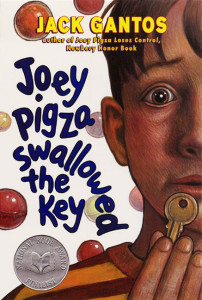You don’t have to spend much time in a school—say a month or so—before you run into a kid (or kids) who is (or are) at once your biggest delight and your biggest terror. They’re charming, they’re delightful, they’re friendly and helpful, and yet, like that semi-wild housecat who keeps dropping dead mice on your front doorstep, they keep making problem after problem, not just for you, but more for themselves. Problems and issues coil around these kids like a whirlwind, and you know that your job and your life, and the universe and everything (sorry, Douglas Adams) would be much easier if you just crossed the street, tucked your chin into your collar, and caught the nearest underground to that universal Eden, “Anywhere Else.”
Joey Pigza is pretty much your average eleven-year-old with undiagnosed and therefore untreated ADD. However, that’s not all that this book is about. Too often, children’s books about characters with a disability are little more than children’s books about disabilities. Character, and especially story, are secondary. “What’s this book about?” you ask. And any ten-year-old who’s read it can answer: “It’s about this kid, and he/she has AIDS/is blind/is deaf/is in a wheelchair/has an alcoholic parent” etc., etc., et banal cetera. There really isn’t anything to the book except this character and his/her disability, and the character is so flat and colorless that they have no personality. After reading the book, you can understand why parents and librarians would be attracted to it, but, having failed to forge a relationship with a main character, you can also understand why kids don’t really care for it.
Fortunately, this book is very much about Joey Pigza. That’s not to say that his ADD is off the radar screen, because it’s not. The main focus of this book, and what makes it so powerful and so appealing, is Joey’s relationships with the people around him and how those relationships are impacted by his ADD. The characters and their relationships, not the disability, are foregrounded here.
So what kind of kid is Joey? He’s likeable. (Most kids with ADD are, at least in the short term.) And he’s observant and intelligent, and as a result he’s smart enough to know that there are people around him who have it much worse than he does. And he’s human enough to feel empathy for them. For example, on his way to the special ed room for the first time, his principal, Mrs. Jarzab, tells him there’s no reason to be afraid. But entering the room, Joey feels something quite different:
…it was hard not to be scared. There were a few kids from upstairs, but the room was mostly filled with the hurt kids, the slow kids, the kids who steered their wheelchairs with their chins, the spastic kids who walked and talked funny and were brought to school in their own special bus or in special cars from home. I always wondered where they went once they arrived. Now I knew. Plus there were a lot of women hovering around who turned out to be moms, helping the teacher with their kids. It was pretty surprising to me that they weren’t at work because mine was always working. But I guess these moms had a whole job just taking care of their kids, which is why I didn’t belong there, otherwise my mom couldn’t work. (36)
Reading that, I was taken aback for a moment. There are precious few adults who are that empathetic, much less eleven-year-olds. But Joey’s empathy is balanced by that bit of egocentrism at the end, which is very much how most eleven-year-olds (not to mention a lot of adults) feel, that they are perfectly normal—it’s the rest of the world which is somehow wonky.
What I like best about Joey, though, is that he’s just so, well, likeable. Just before a birthday party in the special ed room, Joey waves to all the moms that are there. “They smiled at me and waved,” he tells us. “I knew they would like me once they got to know me. Everyone did” (45). It’s not that tons of people like him, it’s that he wants tons of people to like him. In reality, Joey has no friends (a theme which is more thoroughly explored in the sequels), because his ADD prevents anyone from really getting to know him.
I think I’ve said enough, although I could say a lot more—there are issues of child abuse and alcoholism, and I could go on for hours talking about voice. But because I really like this book, I’m going to stop here. I’d rather you were actually reading this book, rather than what I have to say about it. Go out, get this book, read it. And then tell me what you think of it.
Gantos, Jack. Joey Pigza Swallowed the Key. New York: Harper, 1998.
https://bookblog.kjodle.net/2010/04/18/joey-pigza-swallowed-the-key-jack-gantos/

